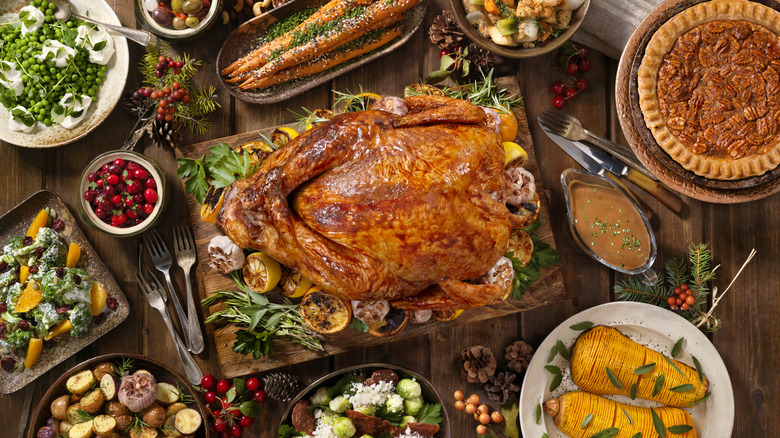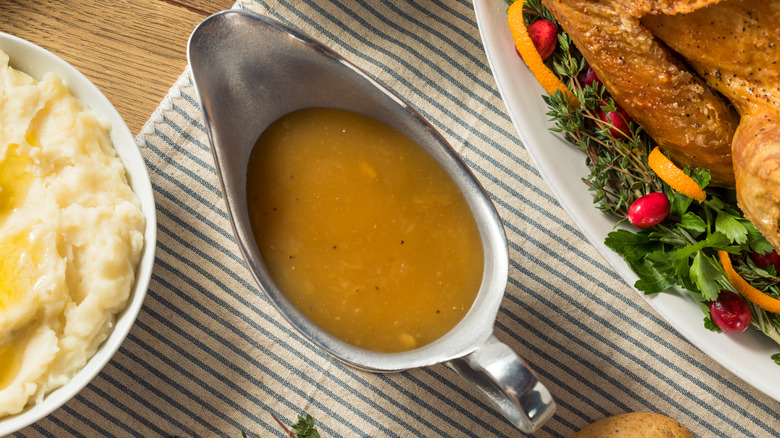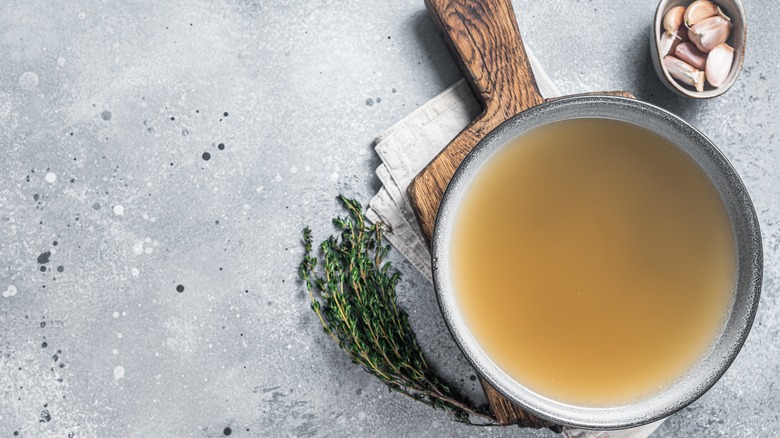Chicken Stock Is All You Need To Curb Thanksgiving Disasters
Chicken stock is a kitchen staple that's ideal to keep on hand for making anything from soups and stews to sauteed greens. Not only does it build rich flavor in a dish, but it's also chock-full of nutrients like protein, collagen, and multiple amino acids. And on Thanksgiving, chicken stock can be your savior with its ability to improve your timing on the turkey and fix common mistakes made when preparing savory sides.
Preparing Thanksgiving dinner requires a strategic plan that often includes coordinating preparation so that all dishes are ready when the turkey is. While there are tons of tips for troubleshooting turkey, there seem to be just as many possible pitfalls — one of which is the turkey taking significantly longer (or shorter) than expected to cook. To minimize issues related to the turkey (and to save oven space), you can make the turkey ahead of time. However, reheating the meat when it's time to eat has the potential to dry it out. That's where the chicken stock comes in.
Keeping chicken stock handy on your stovetop means you can warm that bird right back up. Just place the sliced turkey on a platter and simply ladle the hot stock over it before serving. Preparing the turkey ahead of time and serving it this way serves as damage control against having overcooked side dishes while waiting for the turkey to finish. However, if you do have issues with your sides, chicken stock can save those, too.
How else to use chicken stock
When it comes to sides, there's no shortage of challenges either. If you've made them ahead of time, they can be just as apt to lose moisture as the turkey is when reheating. Or, perhaps in the frenzy of preparing so many dishes, one becomes overcooked. That's when your pot of chicken stock comes in handy again.
Stuffing is a prime example of a dish that tends to dry out. If you've made it the day before, you can spoon a bit of stock over the top before reheating in the oven. However, if your stuffing has finished earlier than your other dishes, create crevices in the stuffing and fill them with stock to keep it warm.
Mashed potatoes can also be finicky. If you've prepared them before the big day and find yourself with a pile of dry, pasty potatoes, try slowly adding chicken stock and mixing until you reach the right consistency. You can also add chicken stock while initially mashing them — just reduce the milk and butter accordingly. And you can even boil the potatoes in the stock for added flavor and a smoother texture.
Finally, no one wants to make the mistake of not having enough gravy to go around, but if it happens, let the chicken stock come to the rescue. Use it to make more gravy, or add it to your existing gravy, adjusting the other ingredients as necessary.
How to make, store, and upgrade chicken stock
If you want to keep chicken stock on hand on Thanksgiving to help mitigate any potential meal disasters, as with anything, it's always best to make it yourself. To make it, you'll need bones, mirepoix, and herbs. If you store it in the refrigerator, it will last for a few days, and you can freeze it for up to three months. But if cooking one more thing before Thanksgiving sounds like a hassle, you can also buy stock at the store.
The upside of store-bought stock is that it typically has a long shelf life — you can typically store it for up to a year. However, be sure to choose stock over broth — broth contains salt, which could add unwanted flavor to your already seasoned dishes. Check the label to make sure that there aren't any added seasonings for the same reason.
Store-bought stock may not have the same rich flavor as homemade chicken stock, but if you're using it to warm or fix your foods, that may not matter. However, if you're looking to elevate it, you can add the same herbs and spices as you would to a homemade version, from onions and garlic to ginger or fennel. Regardless of whether you make it yourself or buy it at the store and dress it up, it's an ingredient you'll be thankful you have on hand on Thanksgiving.



